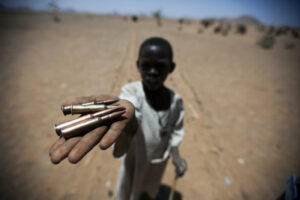Sudan analyst: El Burhan-Hamdok agreement ‘an intermediate stage to avoid bloodshed, international isolation’
The controversial political agreement signed on November 21 by Lt Gen Abdelfattah El Burhan, leader of the military junta that seized power in Sudan in a coup d’état on October 25, and Sudan’s Prime Minister Abdallah Hamdok is “an intermediate stage that allows avoiding the worst effects of the coup, including bloodshed, international isolation, and Sudan’s return to its former pariah status in the international community”.
 Gen Abdelfattah El Burhan and Prime Minister Abdallah Hamdok after signing a political agreement on November 21 (Photo: SUNA)
Gen Abdelfattah El Burhan and Prime Minister Abdallah Hamdok after signing a political agreement on November 21 (Photo: SUNA)
The controversial political agreement signed on November 21 by Lt Gen Abdelfattah El Burhan, leader of the military junta that seized power in Sudan in a coup d’état on October 25, and Sudan’s Prime Minister Abdallah Hamdok is “an intermediate stage that allows avoiding the worst effects of the coup, including bloodshed, international isolation, and Sudan’s return to its former pariah status in the international community”.
US-based Sudanese analyst in African affairs and a specialist in conflict areas Dr Suliman Baldo explained this in an extensive interview with Radio Dabanga about the October 25 coup, its repercussions, and expected scenarios, the first part of which will be broadcast today.
Dr Baldo points out that all economic programmes that were in the process of tackling the economic crisis have been radically halted. He added that the El Burhan-Hamdok agreement has a very specific/limited mission in this aspect. Its only condition is that the civilian Council of Ministers enjoy full executive powers according to what is stipulated in this framework.
“Otherwise,” Baldo says, “the PM has no choice but to resign, together with his ministerial staff”. He added that “If the purpose of the return of Hamdok is to give an undeserved and unjustified legitimacy to the military coup, the international bodies will not recognize this matter even if Hamdok is prime minister”.
Listen to Part One of the interview on Radio Dabanga (in Arabic)
Baldo adds: “But if Hamdok manages to impose a real executive authority, and cancels all the decisions taken by El Burhan during the first coup period as commander-in-chief of the army in the departments and agencies of the state, then there will be a gradual recognition from the international community that civilians have a say and authority in directing the transitional period, and therefore, this may allow the return of some of this aid.”
Baldo stresses that “any sane person, not the international community alone, will wait to see the seriousness and credibility of the coup camp in adhering to the text of the agreement signed with Hamdok on October 21”.
Regarding the reasons behind the October 25 coup, Baldo believes that there were “several reasons that prompted El Burhan, the military, and those who gathered around them from the Sudan Revolutionary Front rebel alliance, Minawi, Jibril, and Islamists affiliated with the former regime of Omar Al Bashir, to be a unified centre for the coup with different interests”.
He explained that one of the main motives of the military for the coup is the proximity of the date set for the transfer of power to civilians in the Sovereignty Council set according to the 2019 Constitutional Document scheduled for November 17, in addition to a legal motive represented in the results of the investigation into the 2019 June 3 massacre at the sit-in in front of the Military Command in Khartoum, which evidence indicates the involvement of the leadership of the military in this.
Another motive for the coup constituted the economic reforms. “These reforms posed a direct threat to the economic interests of the military and security forces that inherited vast empires in money and business independent of the state apparatus as was desired by the regime of deposed Omar Al Bashir,” Baldo explains.
“These arrangements remained in place for the benefit of the units to which the security and military authorities belong, while the Sudanese economy does not benefit from them because they are managed outside the budget,” the expert stated, noting that the economic reforms of Hamdok’s government were “gradually ‘dredging’ these privileges”.
Baldo cites in this regard the unification of the exchange rate. “Companies affiliated with the defence industries during the Al Bashir period were the first to benefit from the multiplicity of forex rates. By applying the unification of the exchange rates, these advantages were removed, and competition with the private sector, exporters, and even individuals became fairer.
As for the rebel leaders Minni Minawi, leader of a Sudan Liberation Movement faction and since August Governor of Darfur, and Jibril Ibrahim, head of the Justice and Equality Movement, and Minister of Finance when the coup took place, Baldo says that “They have now more power, privileges, and decision-making seats than what they got from the peace negotiations in Juba”.
As for the motives “of the Islamists and the remnants of the Al Bashir regime who supported the [October 25] coup”, they “are dreaming of returning to power again and putting a brake on the work of the Empowerment Removal Committee”.

Dr Suliman Baldo is a Senior Policy Advisor for the Enough Project. He recently directed Sudan Democracy First Group, a Sudan-focused think tank aiming to help bring about faster democratisation and peace to the country.











 and then
and then